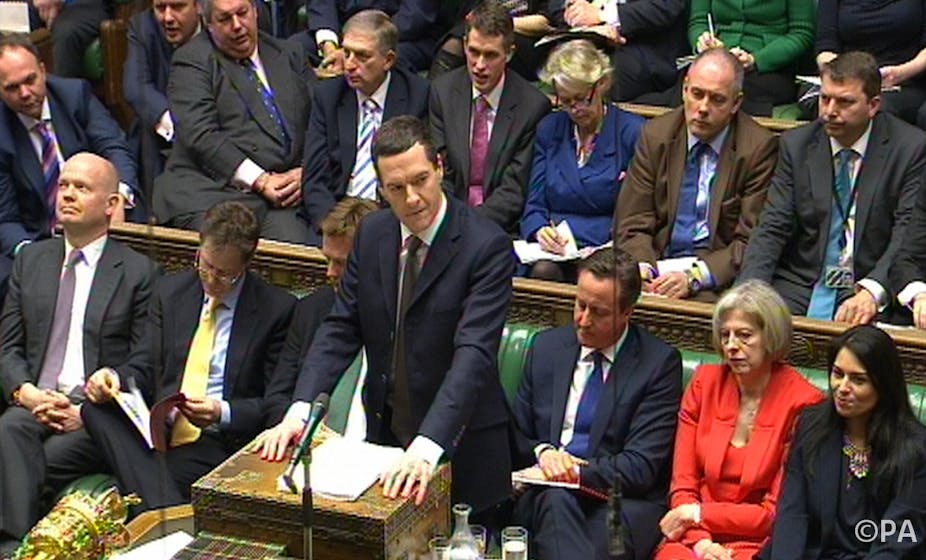George Osborne’s final budget statement for the coalition was his most confident performance to date. If not actually triumphant, it certainly bordered on cocky.
The stony faces populating the Labour front bench told their own story – particularly when the chancellor delivered several well-aimed jokes in the direction of Ed “Two Kitchens” Miliband, and Harriet “Pink Van” Harman.
Osborne mercilessly ridiculed the prospects of a future coalition between Labour and the SNP by referencing the 600th anniversary of the battle of Agincourt “when a strong leader defeated an ill-judged alliance between the champion of a united Europe and a renegade force of Scottish nationalists.”
The massed ranks of Conservative MPs on the government benches roared. It was a clever performance, and Osborne’s most overtly partisan budget speech to date.
Something’s missing
In this budget, Osborne’s omissions were as significant as his inclusions. He had little to say about the NHS even though this is consistently one of the top three issues affecting voting intentions.
Nor did the chancellor mention his own failure to build the new economic model he had promised in 2010 to re-balance the national economy away from debt and consumption-led growth and towards trade and export.
While he mentioned that the budget deficit has been halved as a percentage of national income and would fall to 71.6% of GDP in 2019-20, Osborne also overlooked the fact he had promised to eradicate the structural current budget deficit by 2015-16.
Furthermore, buried away in the figures produced by the Office for Budget Responsibility to accompany the budget was the revelation that household debt is set to increase from £1.728 billion or 145% of household income by the end of June 2015 to £2.495 billion or 172% of household income at the end of March 2020.
While this is less than previously forecast, it still means that economic growth in the next parliament will be driven by an increase in household debt.
Will an electorate already loaded up with near record levels of personal household debt really be prepared to vote for more of the same? After all, the political story of the past 45 years, under prime ministers from Edward Heath to David Cameron, has been a succession of British governments which have promised long-term economic modernisation but delivered a series of short-term booms based on debt, interrupted by painful busts.
Osborne had to look to the future in his last budget rather than dwelling too much on his own performance as chancellor because, in truth, he has conformed to this tradition rather than broken away from it.
Vote winner?
The Conservative Party has not secured 40% in a national opinion poll since March 2012. For the past three years, the party has struggled even to match the 36% share of the vote it secured at the May 2010 general election. Opinion polls have reflected stagnating or falling living standards under the coalition.
In electoral terms, the potentially game-changing “feel good” factor has yet to materialise. That’s because salaries have stagnated under the coalition and have only begun to recover in the past few months.
At the 2010 general election, the Conservative Party won 83 of the 200 most marginal seats and finished second in 79 of them. Osborne’s pledge of a tax cut for 27m people by raising the personal tax-free allowance to £10,800 in 2016 and £11,000 in 2017 may be too little, too late to brighten to mood. This, and many other promises made in this budget felt a lot like promises of jam tomorrow, or rather after May 7.
But as the Office for Budget Responsibility has warned, Osborne’s plans for balancing the books after the election implies a need for the tightest squeeze on spending for five years in 2016 before spending increases kick in from 2019.
Rather than a transition to prosperity, what is on offer is actually further and deeper fiscal austerity. The severity of these squeezes could undermine economic recovery, just as it did during the coalition’s second and third years in office, forcing Osborne to abandon his Plan A policy of expansionary fiscal contraction in 2014-15 and 2015-16
Lest Osborne should forget, in May 1997, the Conservative Party manifesto championed the same themes. Sustained falls in inflation and unemployment, rising living standards, superior economic performance to the rest of Europe, reduced public borrowing, a commitment to cut inheritance tax all featured in the run up to that vote. The electorate duly rewarded the Major government for four and a half years of unbroken economic growth with a 179 seat landslide majority for Tony Blair and New Labour.

